|
A long time ago (250 years thereabouts), a powerful dude named Sakakibara Masamune decreed that the people of his castle town slip into something more comfortable and shimmy downtown for a good time. “Do what?” his attendants asked. “Throw a party, you monkeys! I’m outta here!” Indeed he was, off to rule another fiefdom, but not before starting a tradition that would fill the fine streets of Himeji with colourful summer kimono (ゆかた, yukata), octopus dumplings and (a little later) skyrockets and riot police for three days a year, every year thereafter. More than just a celebration of the highly functional yukata, it’s a fashion show! Women’s yukata colours are brighter, patterns livelier, and shock! horror! their hems are rising. The elderly women of the Good Hood shake their heads and click their tongues at these parading young things in short yukata; the young fellas nod their heads and knock themselves out with their tongues. The Yukata Festival, held June 22-24 every year, also celebrates the rainy season. That’s right, it is the WETTEST time of the year (and news just in: rain is forecast for Sunday June 22nd) which doesn’t stop several hundred thousand people from choking the streets and alleys south of Himeji castle with coin to spend on cold beer, toys and tasty treats. Catering to the masses are more than 800 stalls, erected and manned by a small army of itinerant carnivaleers called tekiya. Word on the street is that tekiya are in cohorts with the local yakuza; others say that’s an unfair image and that the stall holders are just abiding by a ‘system’ which takes a nice slice of their earnings and hands it to the mob. Let’s call it a ‘licensing fee’. The City seems OK with this as it ‘stimulates’ the local economy and frees up their rubber stamps for more pressing matters. 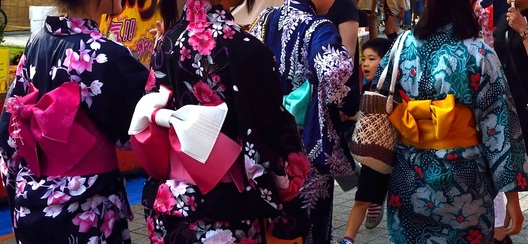 Times have changed since I tagged along with some English teachers to my first Yukata Festival 15 years ago. Then, youth gangs flocked from all over the province to wage theatrical (and sometimes violent) running pitched battles with their rivals on the city streets. Hard to believe in peace-loving Japan? Well listen to this: watching riot police get pelted with skyrockets, drag troublemakers off to paddy wagons by their orange hair, and see the odd motor scooter get barbecued, reminded me of the Costa Rican fruit vendor riots of ‘91 (Yes, I was in Costa Rica in 1991). Cheap entertainment for the masses, poor public relations for the police, not exactly a festive family affair. That’s all gone. The police have changed their tune. They now use subterfuge and infiltration tactics, clever stuff like putting dozens of plain clothes officers into the crowds to catch troublemakers on digital camera or video. Maybe this has worked, or maybe the young punks have just gotten older, gotten married and gotten a job, because the Yukata Matsuri IS now a family affair. ‘Smokin Joe’ Matsumoto, the old kitchen gardener who lives on my street in the Good Hood, will be taking his grandchildren again this year. Those long sleeves of his faded yukata will be sure to hold a pack of cigarettes, a lighter and some coins for cotton candy. My old friend Ono-san won’t be going; she thinks it’s too crowded, too noisy, the food tasteless and too expensive. “I’m saving my yukata for the fireworks festivals,” she says. If YOU go, be sure to drop by the Ghost House at the edge of Otemae park; it has been a going concern for years, adept at taking your money and scaring the beejeezuss out of you with the screams of other teenage patrons. They say a good ghosting chills you out during a long, hot Japanese summer. Personally I’d prefer a cold beer...
0 Comments
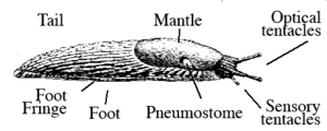 Met my old friend Ono-san in our local ‘shop of ten thousand services’ (yorozuya) the other day. We had stepped into the store from a downpour without seeing each other and met over the tofu tub. “Wet season’s here,” she said, fishing out a brick of bean curd. “Good for the hydrangeas.” “Good for the slugs." “You got ナメクジ problems?" “My bathroom’s a mold palace, the rice paper doors have more ripples than a Seto low tide and my tatami mats are so damp the slugs think they’re water beds.” “You’ve got a way with words.” “If I could sell some I wouldn't have to eat tofu everyday.” The cashier clickety-clacked her abacus beads, devised a sum (how the hell did she do that?) and took my damp yen with a weak smile. Out in the street, rain drops big enough to fill a sake cup smashed on the bald heads of old men too slow or senile to have remembered an umbrella. Wet season, or tsuyu, has arrived. From now until early July it will wrap the Good Hood in a hot, damp blanket. There'll be days of steamy downpours and long, warm drizzle. Moisture and grey sunlight will conspire to turn my old townhouse into a Welcome Inn for terrestrial gastropods. I want to know my enemy, I did some reading: “Like most gastropods, a slug moves by rhythmic waves of muscular contraction on the underside of its foot. It simultaneously secretes a layer of mucus that it travels on, which helps prevent damage to the foot tissues.” (Denny, M. W., Gosline, J. M. (1980). “The physical properties of the pedal mucus of the terrestrial slug, Ariolimax columbianus"). At first, I thought these were instructions on how to Moonwalk. Then I remembered - zoologists don’t dance. Soon Ono-san’s hydrangeas will burst into giant volleyballs of pastel hues and nod their big dripping heads. Neighbors will admire them. My slugs will loll about growing wise and fat on mold and tasty titbits dropped by my kids and my neighbors will laugh. I don’t blame my kids, Hell no, I blame the Shinto gods: the collision of two clumsy giants - one warm and moist, pushing in from the Philippines, the other cold and dry drifting down from Siberia - who gives us what the Japan Meteorological Agency calls with practiced dourness, a “relatively stable bad weather front over Japan which lasts several weeks.” Tsuyu sounds nicer. It means “plum rain,” with no hint of slime, and though I have no idea why the fruity innuendo, I guess it has something to do with the size of the raindrops. In the dead of night a cloudburst can sound like ten million unripe plums being machine-gunned onto the roofs of the Good Hood. On nights of such drama, I curl up beneath my bed sheet, happy to know that between me and nature’s wrath lie roof tiles made by men who knew how to make a roof tile. 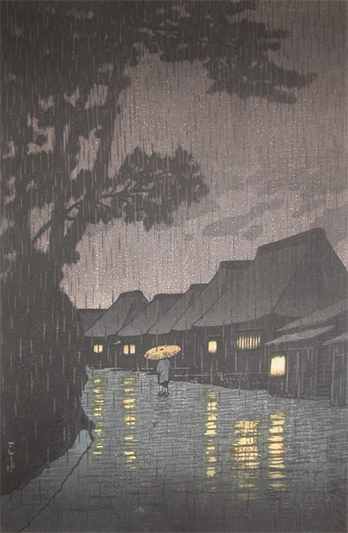 Kawase Hasui: Rainy Night at Maekawa — 相州前川の雨 Kawase Hasui: Rainy Night at Maekawa — 相州前川の雨 Alas, 100-year-old houses like mine do not chill well. They were built to ‘breathe’, with clay-mud walls and paper doors that absorbed, filtered and circulated air, light and moisture. Modern household clutter like plasma screen TeeVees and rice cookers nullifies this effect. It turns a large, breezy house into an Amazon riverboat filled with empty wine bottles and a cabin fever that can turn sane men into serial killers. Yet the people of the Good Hood, and of greater Himeji city, endure. They have done for centuries. They sling bamboo shades from their windows, hang wind chimes from their eaves, flap uchiwa and sensu hand fans against their streaming faces and flock to the rooftop beer gardens downtown, hopeful for a salty breeze off the Seto Inland Sea. “There are people who complain about the wet season,” says Ono-san. “But look at the positives. The city is cleansed, cedar pollen and Gobi sand are flushed away AND it’s good for the..." “Hydrangeas.” I don’t think I’ve ever met a woman so adept at turning lead into gold. Days later we are inundated. The Good Hood turns riverine in minutes. My courtyard floods, runoff by-passes the roof guttering causing the storm water drains to overflow. The Semba River becomes a superhighway for lost volleyballs, Coke bottles, milk cartons, baseballs and beer cans, all racing towards the Seto Inland Sea. Next day on the train to Ako, 30 klicks west of Himeji, the land looks like a broken mirror: flooded rice paddies reflect a powder blue sky filled with thunderheads, farm hamlets and green mountains lumpy as a dragon's back. Green. Lumpy. Slugs. Gotta stop by the yorozuya on my way home, pick up a sack of salt for my new house mates. |
This Blog:What is the essence of a traditional Japanese neighbourhood? Writing from my home in Himeji, a castle town in western Honshu, Seaweed Salad Days distills, ferments, presents! Archives
March 2024
Categories
All
|
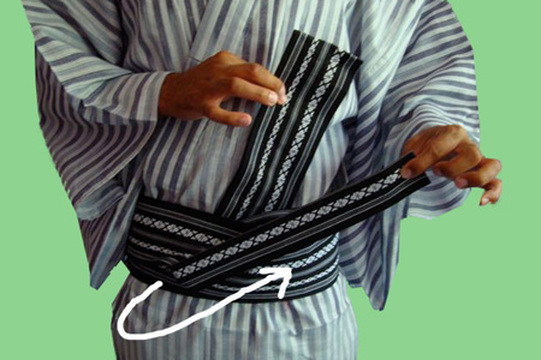
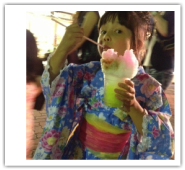

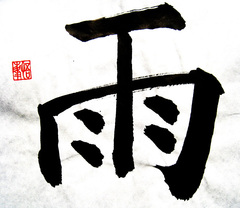
 RSS Feed
RSS Feed
